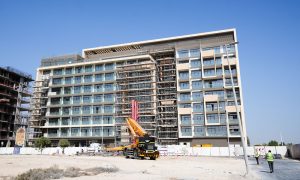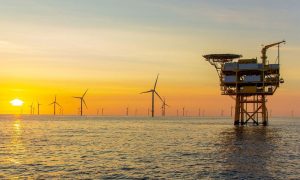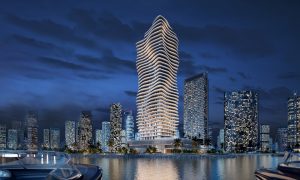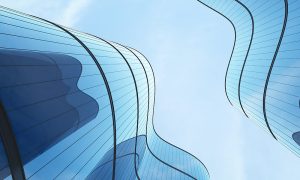Part of the story of Dubai
Arabtec CFO Ziad Makhzouni talks to The Big Project about world economics, rumours, awards and the history of one of the UAE’s first construction companies

Last month Arabtec Holding’s shares leapt to new heights when, on November 13, it was “announced” that a “new major contract” had been awarded to the multi-disciplinary conglomerate.
“For some reason we were just over 50% of the whole market trading. There were rumours, which are incorrect, and I basically had to explain to the people that if there is anything to declare to the market we will declare it,” Makhzoumi says, adding that the rumours were “absolutely funny and ridiculous”.
It’s not the first time it’s happened. When there was the possibility of an investment from Aabar, Makhzoumi says the rumours went into overdrive, despite the firm being bound by regulations that stated all announcements must officially be made via ESCA and the Dubai Financial Market (DMF).
In his three years with the firm Makhzoumi has not only transformed the balance sheet, but prides himself on his transparency with shareholders, via both the board and media.
Recent winner of the ‘most admired CFO’ award, and other accolades including ‘revolutionary CFO’ – joking that it’s because “I scare the hell out of people”
– Makhzoumi’s background is in finance, rather than accounting, with experience of structuring finance in operations, acquisitions and start ups.
Having previously worked as a strategy consultant, he also headed one of the biggest funds in the UK.
Approached by Arabtec senior management to take on the role of CFO in 2008, Makhzoumi says he was recruited to develop investor relations, restructure operations and also to fine tune the all important balance sheet.
“If you look at the balance sheet three years ago, the borrowing was extremely high and the cash extremely low. There were big amounts of receivables.
If you look at the balance sheet now you see more cash than borrowing for the first time in three years.
This is the second quarter and I think the trend will continue,” he comments.
Makhzoumi says payments and receivables now match and that the average age of the receivables has gone down “drastically”.
“This is exactly what I said to the board three years ago, and that was the priority. Not to grow and not make a profit or concentrate on margins, because the market was going through extreme uncertainties and anyone who can achieve high margins, good luck to them because that will be a fluke,” he continues to say of the successful strategy.
“We can see the world economies are shrinking, but what helped is that we moved, in my view very quickly, into new markets. You can’t move quicker. You can’t move 10,000 people to Saudi Arabia over night because of the visa issues,” Makhzoumi adds.
Yet despite his and the board’s aims being achieved – and publically recorded in black and white – Makhzoumi says the reporting of Arabtec’s success hasn’t always been factual. Attributing the trend to the youth of both the market and its fourth estate, Makhzoumi says the reporters and analysts covering the decade old DFM assume conclusions that don’t reflect reality.
Explaining that the media covering a developed market has the experience and background necessary to do so accurately, Makhzoumi says he has experienced cases where he has featured in an “interview” that didn’t even take place.
“Some analysts read the press and assume it’s correct, but the press want to excite people and the headline may not have any relation to what’s in the analysis and there are many examples of that. If it’s critical I correct them, if it’s not I laugh, because it doesn’t make any sense.”
Using the example of events in Q4 2008 and Q1 2009, he says media analysis contradicted both itself and the balance sheet.
“Reporters would say ‘now that Nakheel is paying its bond Arabtec has a lot of cash’. But you can’t jump from one situation to another overnight, you have to look at the balance sheet because the balance sheet doesn’t lie. It’s all facts and figures.”
Growth and maturity
Established in 1975, Arabtec’s first project was the 17 storey Pearl Building on Dubai Creek, then the tallest building in Dubai. From there, founder Riad Kamal built the technical partnerships and alliances that 30 years later saw Arabtec Construction LLC play a vital role in the world’s tallest building, Burj Khalia.
Today, the public limited company has around 7000 shareholders and operates across 17 countries including the UAE, Qatar, Bahrain, Kuwait, Saudi Arabia, Palestine, Pakistan and soon India, with work also compelted in Russia. In addition there are a number of subsidiaries covering electromechanical, engineering, steelworks, concrete and construction equipment.
With 70,000 people employed directly and indirectly by Arabtec, when world economies crashed, the strategy was to restructure and re-position in markets that would “give immediate opportunities, without us investing big amounts of capital”.
Saying the approach was a combination of market predictions and quick reactions, the priority was a healthy balance sheet, without which “you cannot do anything”.
Currently filling more than 8000 visas in Saudi Arabia, those other markets include Qatar and Abu Dhabi and new ventures in India, with future bets depending on the security situations in Iraq, Egypt and Syria.
“It’s a marathon, not a sprint,” comments Makhzoumi, ruling out Turkey because of the strength of local companies and the ability to tender competitively against them.
Today, the backlog margin is “healthy”, with about two and a half years of work in real terms. A predicted AED5 billion will be delivered
by the end of Q4 2011, averaging betweel AED 1 billion and AED 1.5 billion per quarter, yet Makhzoumi comments “we can deliver much more”.
Acquisition and delivery predictions for 2012 stand at AED 12-16 billion.
On a subsidiaries level the backlog stands at AED 14 billion for the last three quarters, due mainly to the strength of the oil and gas sector.
Of the projects that are now at a standstill, Makhzoumi says the company is now in talks with project partners to explore the opportunities to re-structure, rather than enforce the legal agreements partners may have breached.
“We are part of the story of Dubai. Many of the monumental landmarks we were involved within one way or another such as the Burj Al
Arab and the dome of Emirates Palace in Abu Dhabi,” he says, adding: “We are very proud of what we have done.”
Playing down his success, when it came to weathering the global economic storm Makhzoumi says the company and board “already knew what needed to be done”.
“When things were bad I said we cannot just walk and leave. You have to work and help Dubai through these difficult times. If a member of the family needs help our culture would go in and help. It’s not easy, but we all went through this and I think we came out better and stronger in my view.”

























